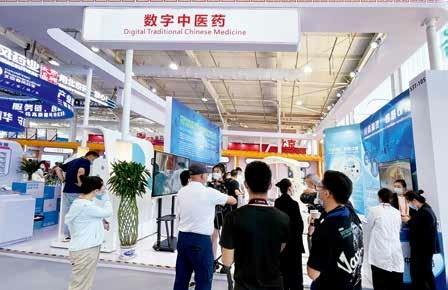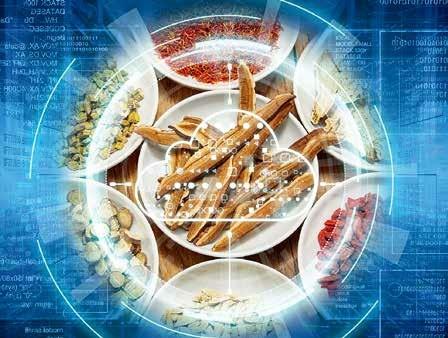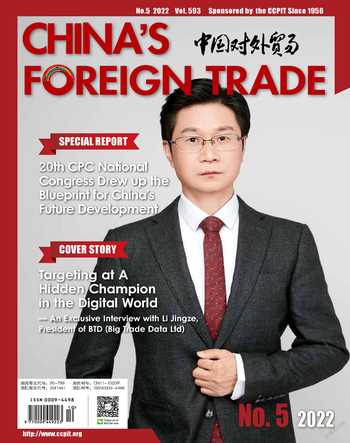The Traditional Chinese Medicine Industry Is Going Digital
By Liu Xinwei


“In recent years, with the transformation of health concepts and medical models, the efficacy and role of traditional Chinese medicine have been increasingly recognized and accepted by the international community. Traditional Chinese medicine has now spread to more than 190 countries and regions, and has been included in people-to-people exchange and cooperation mechanisms between China and many governments,” said Chen Zhu, Vice Chairman of the Standing Committee of the National Peoples Congress, at the fifth Belt and Road Initiative Forum on Traditional Chinese Medicine Development(hereinafter referred to as the Forum).
Traditional Chinese medicine is safe and effective in fighting the pandemic
The combination of traditional Chinese and Western medicine and the emphasis on both Chinese and Western medicine are a major feature of Chinas COVID-19 prevention and control efforts. In March this year, the WHO released a report on its official website, saying that traditional Chinese medicine is safe and effective in the treatment of COVID-19, and recommended all the member countries to learn from and promote traditional Chinese medicine. The report expressed gratitude towards the Chinese government and researchers for their tremendous investment and efforts in enhancing knowledge and developing COVID-19 therapies since the outbreak of the pandemic, and concluded that further research on traditional Chinese medicine in the treatment of COVID-19 is necessary.
“We hope that countries can learn from Chinas medical model and will consider incorporating traditional medicine interventions into clinical management planning in your health care systems to provide new impetus for speeding up the recovery from the pandemic,” said Ban Ki-moon, former United Nations Secretary-General at the Forum.
Ren Hongbin, Chairman of the China Council for the Promotion of International Trade, said at the Forum that since the outbreak of the epidemic, traditional Chinese medicine has been effectively involved in both prevention and treatment, which have achieved favorable results, fully demonstrating its safety and effectiveness. Under the framework of the Belt and Road Initiative, China has introduced traditional Chinese medicine diagnosis and treatment programs in more than 150 countries and regions, provided TCM products to over 10 countries and regions, and sent TCM experts to 29 countries and regions to help guide the fight against the pandemic.

Ren suggested expanding exchanges and cooperation and strengthening policy communication. Policy communication is an important guarantee and prerequisite for TCMs high-quality integration into the Belt and Road Initiative. The CCPIT is ready to work with its counterparts in other countries to connect more closely with enterprises, further strengthen exchanges and cooperation in the field of traditional Chinese medicine, increase the supply of quality traditional Chinese medicine services, and promote the soft connectivity of traditional Chinese medicine standards and rules.
At the same time, it is necessary to build a service platform to promote unimpeded trade. “We hope that enterprises from all countries will make full use of the trade and economic exchange platforms such as the China International Fair for Trade in Services to vigorously promote trade in traditional Chinese medicine services and accelerate the integrated development of traditional Chinese medicine services with tourism, health and other industries. The CCPIT is willing to jointly hold more exhibitions and forums with business associations from various countries, so as to start dialogue, connect projects, seek cooperation and build bridges for TCM enterprises, and expand TCM trade exchanges,” explained Ren Hongbin.
Ren Hongbin also expressed the hope that medical institutions and enterprises in various countries will carry out various traditional Chinese medicine promotion and exchange activities under the framework of Belt and Road Initiative international cooperation, promote mutual learning about traditional medicine, push forward the innovative development of traditional medicine, and make traditional Chinese medicine a health messenger of the Belt and Road Initiative.
Legal framework for certification has been established
Liu Weijun, Director of the Certification Supervision and Management Department of the State Administration for Market Regulation, pointed out at the Forum that quality certification is an internationally accepted quality management means and trade facilitation tool. At present, there are 1,000 certification institutions in China, which have issued more than 3.1 million valid certification certificates, involving more than 900,000 enterprises, and facilitating the smooth entry of Chinese products and services into the international market. Similarly, quality certification has also played an important role in the development of traditional Chinese medicine.
In order to safeguard the dignity of subjects and protect their health and rights, the State Administration for Market Regulation and the Administration of Traditional Chinese Medicine have jointly promoted a TCM ethical review and accreditation mechanism. So far, 60 research institutions have obtained this certification.
Organic products are vital to the traditional Chinese medicine industry and play a positive role in environmental protection and sustainable development. In recent years, the State has continuously promoted the certification of organic traditional Chinese medicine products. At present, a total of 1,037 enterprises have obtained certification in organic traditional Chinese medicine products.
In the certification of authentic medicinal materials, progress is also very smooth. At present, there are 112 enterprises in China producing products which have been certified as authentic brands, covering more than 50 counties where this traditional Chinese medicine is produced.
“Quality certification can provide important support for the high-quality development of the TCM industry, and can help the industry achieve better, healthier and more sustainable development,” said Liu Weijun.
In 2020, the National Medical Products Administration formulated and issued the Implementation Opinions of the CPC Central Committee and the State Council on Promoting the Inheritance, Innovation and Development of Traditional Chinese Medicine to reform and optimize the registration and classification of TCM based on its clinical value, and to change the use of the material basis as the foundation for TCM registration and classification. The registration classification of traditional Chinese medicine is divided into innovative medicine, improved new medicine, and ancient classic Chinese medicine compound preparations with the same name, such that registration classification is more consistent with the law regarding the development of traditional Chinese medicine.
According to Wang Hainan, Deputy Director of the Drug Registration and Administration Department of the National Medical Products Administration, the reform has greatly enriched the categories of traditional Chinese medicine, simplified approval procedures, and reduced clinical trials. At the same time, new tools, new standards and new methods have been introduced to develop and encourage evaluation criteria that conforms to the characteristics of traditional Chinese medicine and highlights the therapeutic advantages of traditional Chinese medicine. In addition, an evidence review system based on TCM theory combined with human experience and clinical trials is constructed.
“At present, the legal framework of the approval and evaluation system conforming to the characteristics of traditional Chinese medicine has been preliminarily established, and a registration and application procedure with traditional Chinese medicine characteristics has been opened up, which, to some extent, stimulates the research and development vitality of new drugs,”??Wang Hainan said.?
Chen Zhu believes that in the future, it will be necessary to more actively participate in the research and development of international standards and norms related to traditional medicine, and to strengthen cooperation with the countries of the Belt and Road Initiative in terms of traditional medicine policy formulation, personnel qualification, product registration, market access and quality supervision.
New progress made in digital reform of traditional Chinese medicine
Science and technology represented by the Internet, big data and artificial intelligence have so far penetrated all areas of the economic society. Digital transformation is driving the transformation of related industries such as healthcare and trade in services. It plays an important role in strengthening the protection and utilization of traditional Chinese medicine resources, strengthening the production and management of authentic medicinal materials, improving the development level of the traditional Chinese medicine industry, building a high-quality and efficient service system for traditional Chinese medicine, and developing trade in traditional Chinese medicine services.
Zhejiang Province has been leading the country in digital development. Around “Digital Zhejiang”, the Provincial Health Commission and Administration of Traditional Chinese Medicine launched digital healthcare reform with “healthy brain +” as the core, focusing on the three domains of medical medical, digital health management and smart public health. Dozens of innovative application scenarios have been built, such as“Zhejiang doctor mutual recognition”,“Zhejiang pandemic prevention”,“Zhejiang first aid” and “Zhejiang traditional Chinese medicine”.
At the Forum, Cao Qifeng, Deputy Director of the Zhejiang Provincial Health Commission, introduced the fact that the province has made new achievements in the digital reform of traditional Chinese medicine with the reform of “TCM and combined prescription” as the starting point. “TCM and combined prescription” establishes a TCM standardization system and builds standardized prescription data by creating TCM prescriptions, electronic medical records, TCM digital codes, TCM preparation codes, acupuncture codes and grade standards of TCM decoctions. At the same time, the prescription big data center is constructed to realize the four functions of “intelligent doctor”, “intelligent medicine”, “intelligent research” and“intelligent treatment”. In addition, a series of innovative application scenarios have been constructed, such as digital comprehensive supervision of traditional Chinese medicine, traditional Chinese medicine cloud prescription, shared traditional Chinese medicine pharmacies, and citizens learning traditional Chinese medicine.
With 115 years of history, Shandong Hongjitang Pharmaceutical Group is also at the forefront of innovation. Gao Yuankun, Chairman of Shandong Hongjitang Pharmaceutical Group, said at the Forum that Hongjitang has established a working mechanism for TCM policy linkage innovation in Jinan, Hengqin and Macao in the Guangdong-Hong KongMacao Greater Bay Area. More than 20 types of Chinese patented medicines have been approved by Macao for filing and sold to Southeast Asia, Portuguesespeaking countries and many countries and regions involved in the Belt and Road Initiative.
The academic exchange and extensive spread of collateral disease theory is also one of the important factors for promoting the “going out”of traditional Chinese medicine. In recent years, the organization known as the Collateral Disease Society has developed vigorously. The Collateral Disease Society has established branches in the United States and Europe, and the English version of Collateral Disease has been published overseas.
Yiling Pharmaceutical, which was founded in 1992 by Professor Wu Yiling, academician of the Chinese Academy of Engineering, is a national key high-tech enterprise. It has developed 13 nationally patented new drugs under the guidance of collateral disease theory. During the pandemic, Yiling Pharmaceutical innovated the Lianhua Qingwen granule, which was approved for the indication of COVID-19 and was approved for listing in nearly 30 countries and regions, successfully “entering” the frontline of the international fight against the pandemic.
In 2021, Lianhua Qingwen was included in Cambodias home treatment plan for patients with mild COVID-19.“The combination of the COVID-19 vaccine and the traditional Chinese medicine Lianhua Qingwen has played an important role in Cambodias fight against the pandemic, greatly reducing the chance of severe cases,”Cambodian Health Minister Mam Bunheng said.
Ren Hongbin also said that traditional Chinese medicine cooperation has become a key area of science and technology innovation cooperation under the Belt and Road Initiative, an important part of the high-quality development of the Belt and Road Initiative, and an important carrier for promoting the building of a community of human health.
- China’s foreign Trade的其它文章
- The Development of Foreign Trade in China over Last Decade:Higher-level Opening-up to the Outside World
- New Changes in Travel:Past Visitors Are Become Today’s Experiencers
- China’s Livestreaming Enters A New Phase of Development
- The Pension Industry Calls for New Models and Ecology
- Digital Technology Promotes China-foreign Trade in Agricultural Services
- As Shipping Costs“Dive”,It Is Imperative to Improve the Layout of Industrial Chain

